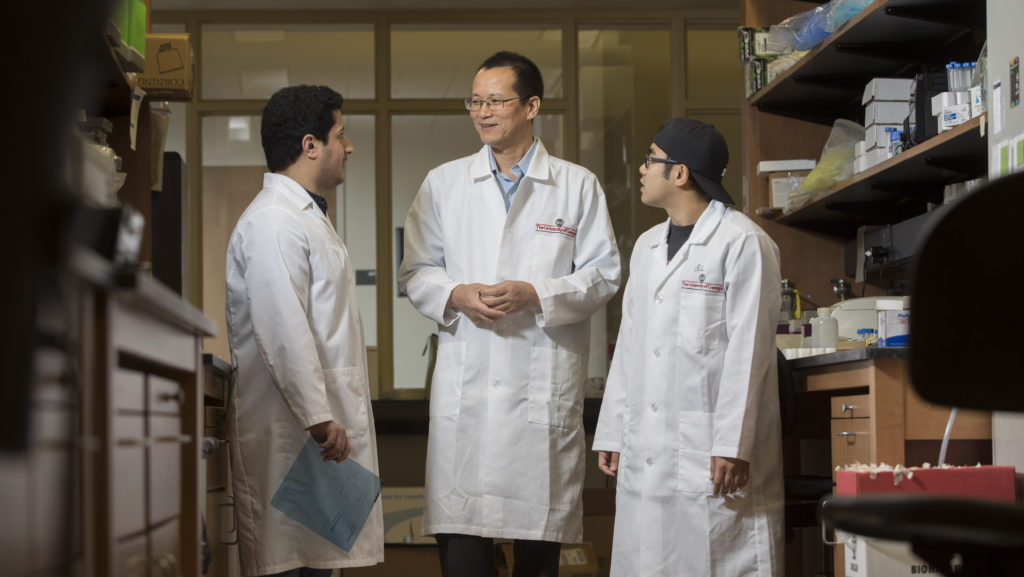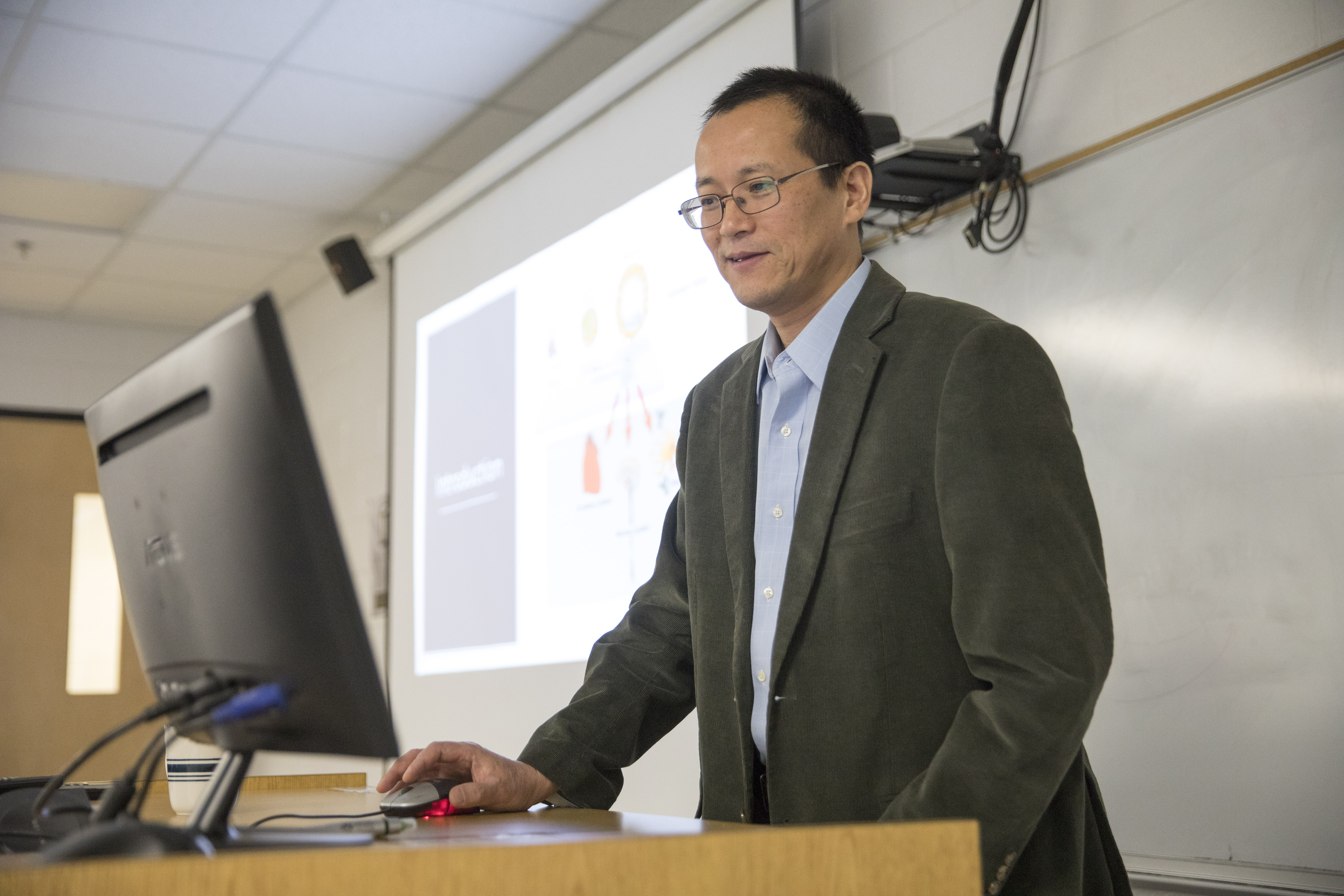Houjian Cai, an assistant professor in the College of Pharmacy, is exploring the cellular mechanisms that drive the formation and spread of prostate cancer, with the ultimate goal of developing new drugs to treat the disease.
Where did you earn degrees and what are your current responsibilities at UGA?
I received my Bachelor of Science degree in biology from Wenzhou Teachers’ College (now Wenzhou University) in China and hold two master’s degrees, one from Nanjing University in China and the other from UNESCO-IHE (International Institute for Hydraulic and Environmental Engineering) in the Netherlands. I received my Ph.D. from the University of Tennessee, Knoxville.
I am currently an assistant professor in the department of pharmaceutical and biomedical sciences in the College of Pharmacy. I am interested in cancer research, and I teach human physiology at the undergraduate level and molecular and cancer biology at the graduate level.
When did you come to UGA and what brought you here?
I joined the UGA faculty in July 2013. When I was a graduate student, I dreamed of becoming a professor in a university and pursued my research interests in science. UGA has provided outstanding research facilities and an environment for collaboration. The department of pharmaceutical and biomedical sciences and the College of Pharmacy have provided generous support to allow me to establish my research lab. I am very grateful to be in such a diverse research environment. I can always find research collaboration within the department or elsewhere on campus.
What are your favorite courses and why?
Evolution, which not only demonstrates the biological connection among species but also occurs in cancer progression. The progression of cancer is an evolutionary process where genomic mutations and other alterations are accumulated in tumors. The constant mutations and changes of cancer cells lead to their escape from therapeutic treatment and enable them to keep proliferating after developing drug resistance. Cancer biologists are fighting an ongoing evolutionary process in cancer cells. Hopefully, one day we can outsmart them to cure cancer patients.
What are some highlights of your career at UGA?
The moment when I know that my ongoing research will be funded is always exciting. These moments are when I receive confirmation of awards from external agencies such as the National Institutes of Health or the Department of Defense or from internal funding sources such as the UGA-Augusta University Seed Funding Program. These highlights are crystallized from the tremendous efforts of postdoctoral fellows, graduate students and undergraduates in my lab.
How do you describe the scope and impact of your research or scholarship to people outside of your field?
My research explores the cellular mechanisms that drive the formation and spread of prostate cancer, with the ultimate goal of developing new drugs to treat the disease.
I am very grateful to have started my independent research career at UGA, where I have extended my research on the oncogenic functions of an enzyme known as tyrosine kinase in prostate cancer. My lab has characterized the importance of a modification known as protein myristoylation that is involved in the regulation of cancer progression. Our studies also show that this modification enables dietary saturated fatty acids to accelerate tumor progression. Our goal is to identify drugs that treat cancer by interfering with the myristoylation process.
How does your research or scholarship inspire your teaching, and vice versa?
Teaching provides a great opportunity to communicate with graduate and undergraduate students in the classroom. It allows you to display not only your personality but also a way of thinking about science. Some students eventually become members of my research team through the interaction or establish collaborations. The passion for science in the young generation always inspires me in research and pushes me forward to uncover new ideas.
What do you hope students gain from their classroom experience with you?
For undergraduate students, I hope that they learn how to teach themselves under the guidance of an instructor, truly understand the knowledge taught in the classroom, and develop curiosity about unexplored scientific territory.
For graduate students, I hope they develop their critical thinking as it relates to their studies, their research and the research of others. This ability requires broad knowledge and keeping up-to-date on research trends in the field.

Describe your ideal student.
An ideal undergraduate student should have curiosity and passion for pursuing knowledge. A student should not only appreciate the scientific knowledge in the textbook, but also prepare him or herself for exploring unknown territory in science.
An ideal graduate student should have motivation, responsibility and persistence in his or her pursuits. At the frontiers of science, an ideal student should be able to learn from failure and have an ability to face inevitable frustrations.
Favorite place to be/thing to do on campus is…
It is a place where I sit with thousands of people in red and black, and a place where I can scream my lungs out. This place brings me excitement and wipes out the stress from work and life. I am proud to be a Dawgs fan. Go DAWGS!
Beyond the UGA campus, I like to…
I am ecstatic about DJ music. Although intense research occupies most of my time, once in a while I will dance to my heart’s content. That is the most enjoyable way to be relaxed for me. When I am in that environment, I dance like no one is watching.
Community/civic involvement includes….
I served as the principal of Athens Chinese School in 2016 and as a board member in 2017. The school provides Chinese language education two hours a week for kids age 5 and older. The majority of students are of Chinese descent, but the school also has students of different ethnic backgrounds. The school has multiple levels of classes on Chinese language and culture. We hope that it helps youth appreciate Chinese culture and maintain their Chinese language. The school also provides a stage for UGA staff and faculty to share their life experiences in Athens and beyond.
Favorite book/movie (and why)?
“The Godfather” is one of my favorite movies. The movie describes well how people should be disciplined, loyal and organized for what they are working on. (Ideally, they should work for the good of society. I condemn the organized crime, of course.) Science requires a person to possess these essential characteristics to be successful. It also requires a person to be creative, and have a mindset that “nothing is impossible.” The movie reminds me to focus and devote myself to science.
The one UGA experience I will always remember will be…
I witnessed a historic moment in UGA football when UGA faced off against the University of Alabama in the National Championship. Although the game was lost, it inspires me when a former assistant coach could challenge his former head coach. History will be made when the waves behind drive on those ahead. Go DAWGS!!


